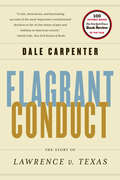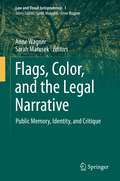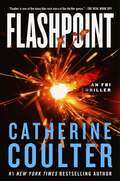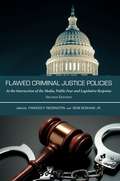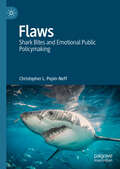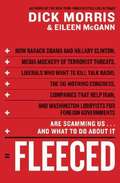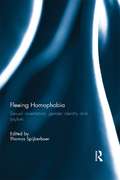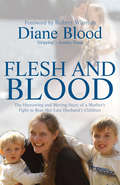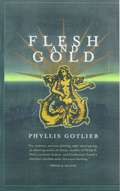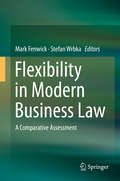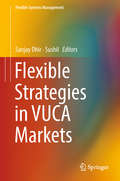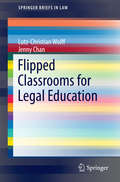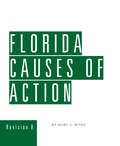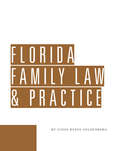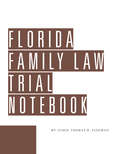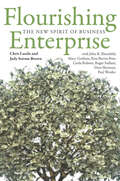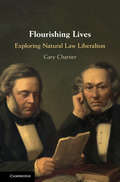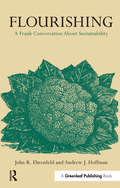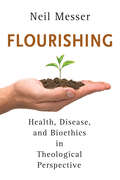- Table View
- List View
Flagrant Conduct: How a Bedroom Arrest Decriminalized Gay Americans
by Dale Carpenter"A highly informative, detailed, even thrilling account of how the Supreme Court arguments reshaped American law."--Michael Bronkski, San Francisco Chronicle No one could have predicted that the night of September 17, 1998, would be anything but routine in Houston, Texas. Even the call to police that a black man was "going crazy with a gun" was hardly unusual in this urban setting. Nobody could have imagined that the arrest of two men for a minor criminal offense would reverberate in American constitutional law, exposing a deep malignity in our judicial system and challenging the traditional conception of what makes a family. Indeed, when Harris County sheriff's deputies entered the second-floor apartment, there was no gun. Instead, they reported that they had walked in on John Lawrence and Tyron Garner having sex in Lawrence's bedroom. So begins Dale Carpenter's "gripping and brilliantly researched" Flagrant Conduct, a work nine years in the making that transforms our understanding of what we thought we knew about Lawrence v. Texas, the landmark Supreme Court decision of 2003 that invalidated America's sodomy laws. Drawing on dozens of interviews, Carpenter has taken on the "gargantuan" task of extracting the truth about the case, analyzing the claims of virtually every person involved. Carpenter first introduces us to the interracial defendants themselves, who were hardly prepared "for the strike of lightning" that would upend their lives, and then to the Harris County arresting officers, including a sheriff's deputy who claimed he had "looked eye to eye" in the faces of the men as they allegedly fornicated. Carpenter skillfully navigates Houston's complex gay world of the late 1990s, where a group of activists and court officers, some of them closeted themselves, refused to bury what initially seemed to be a minor arrest. The author charts not only the careful legal strategy that Lambda Legal attorneys adopted to make the case compatible to a conservative Supreme Court but also the miscalculations of the Houston prosecutors who assumed that the nation's extant sodomy laws would be upheld. Masterfully reenacting the arguments that riveted spectators and Justices alike in 2003, Flagrant Conduct then reaches a point where legal history becomes literature, animating a Supreme Court decision as few writers have done. In situating Lawrence v. Texas within the larger framework of America's four-century persecution of gay men and lesbians, Flagrant Conduct compellingly demonstrates that gay history is an integral part of our national civil rights story.
Flags, Color, and the Legal Narrative: Public Memory, Identity, and Critique (Law and Visual Jurisprudence #1)
by Anne Wagner Sarah MarusekThe book deals with the identification of “identity” based on culturally specific color codes and images that conceal assumptions about members of a people comprising a nation, or a people within a nation. Flags narrate constructions of belonging that become tethered to negotiations for power and resistance over time and throughout a people’s history. Bennet (2005) defines identity as “the imagined sameness of a person or social group at all times and in all circumstances”. While such likeness may be imagined or even perpetuated, the idea of sameness may be socially, politically, culturally, and historically contested to reveal competing pasts and presents. Visually evocative and ideologically representative, flags are recognized symbols fusing color with meaning that prescribe a story of unity. Yet, through semiotic confrontation, there may be different paths leading to different truths and applications of significance. Knowing this and their function, the book investigates these transmitted values over time and space. Indeed, flags may have evolved in key historical periods, but contemporaneously transpire in a variety of ways. The book investigates these transmitted values: Which values are being transmitted? Have their colors evolved through space and time? Is there a shift in cultural and/or collective meaning from one space to another? What are their sources? What is the relationship between law and flags in their visual representations? What is the shared collective and/or cultural memory beyond this visual representation? Considering the complexity and diversity in the building of a common memory with flags, the book interrogates the complex color-coded sign system of particular flags and their meanings attentive to a complex configuration of historical, social and cultural conditions that shift over time.Advance Praise for Flags, Color, and the Legal Narrative"In an epoch of fragmentation, isolation and resurgent nationalism, the flag is waved but often forgotten. The flag, its colors, narratives, shape and denotations go without saying. The red flag over China, the Star-Spangled Banner, the Tricolore are instantly recognisable and over determined, representing a people, a nation, a culture, languages, legacies, leaders. In this fabulous volume flags are revealed as concentrated, complex, chromatic assemblages of people, place and power in and through time. It is in bringing a multifocal awareness of the modes and meanings of flag and color in public representations that is particular strength. Editors Anne Wagner and Sarah Marusek have gathered critical thinkers from the North and South, East and West, to help know the essential and central - yet often forgotten and not seen - work of flags and color in narratives of nation, conflict, struggle and law. A kaleidoscopic contribution to the burgeoning field of visual jurisprudence, this volume is essential to comprehending the ocular machinery through which power makes, and is seen to make, the world."Kieran Tranter, Chair of Law, Technology and Future, Faculty of Law, Queensland University of Technology, Australia"This comprehensive volume of essays could not be arriving at a more opportune time. The combined forces of climate change, inequality, and pandemic are causing instability and painful recognitions of our collective uncertainties about nationhood and globalism. In the United States, where I am writing these few lines, our traditional red/white/blue flag has been collapsed into two colors: Red and Blue. While these colors have semiotically deep texts, the division of the country into these two colors began with television stations designing how to report the vote count in the 2000 presidential election year creating "red" and "blue" parties and states. The colors stuck and have become customary. We Americans are told all the time by pundits that we are a deeply divided nation, as proven by uns
Flash's Song
by Kay PfaltzWhat if most people have it wrong, and miracles are not the exception but the norm? Flash's Song is the true account of how one person discovered the secret of miracles. It is a story of the power of laughter, the power of family, and, ultimately, the power of love to get us through life.Freelance writer Kay Pfaltz was living a quiet, simple life with her three beloved dogs when suddenly her life turns upside down. Coming to terms with a failed relationship, she must now take her ailing dachshund, Flash, in for back surgery. But when the vet tells Kay that Flash's problem is not a disc but in fact a tumor growing on his spine and Flash has, at most, three weeks to live, Kay is devastated. From here begins a journey of self-discovery and recovery that will open Kay's heart to the greatest miracle of all.Flash's Song tells the story of amazing canine courage and remission against all odds. It is a ballad of love and redemption, and a moving account of how Flash's three-week prognosis became five and a half miraculous months of learning, loving, and finally accepting.Written in luminous prose, accompanied by poignant photos, and filled with keen insight into love, faith, and the power of forgiveness, Flash's Song is not only a heartwarming ode to a little dog, but also a tribute to life and an invitation to cherish every moment of it.
Flashpoint: An FBI Thriller (An FBI Thriller #27)
by Catherine CoulterAgents Savich and Sherlock are back in the latest installment in Catherine Coulter’s #1 New York Times bestselling FBI Thriller series, where the past refuses to stay buried.A year has passed since Elizabeth Palmer was nearly killed with hundreds more in the attempted bombing of St. Paul’s in London, believed to be a terrorist act until the police discovered it was a cover for something even more sinister. For Elizabeth, life is finally back to normal. She’s optimistic, her painting is getting accolades, when suddenly her world changes in a flash. With three new attempts on her life, and her connection to the terrorist attack, MI-5 gets involved to find out who is trying to kill her and why.Autumn Backman, twelve years old, begrudgingly accepts a summer job to shepherd Tash Navarro, a shy, bullied little boy. He’s staying with his uncle while his father and stepmother go on a honeymoon in Europe. Then the unexpected happens. Autumn learns Tash is gifted psychically, like her, and Tash’s father, Archer Navarro, is suspected of embezzling from his own firm. The FBI and Interpol are on the case, but Archer and his new wife have disappeared. Tash is scared and convinced his father needs help, so Autumn reaches out to Dillon Savich, the only person she knows who can find them.Desperate for answers, Elizabeth flies to Washington, D.C., to seek out Savich and Sherlock and is assigned Special Agent Rome Foxe for protection. With deadly assailants in terrifying pursuit, Elizabeth and Rome soon find themselves neck deep in danger and in a race for survival.Buckle up for a nonstop, action-packed thriller from the one and only Catherine Coulter.
Flawed Criminal Justice Policies: At The Intersection Of The Media, Public Fear And Legislative Response
by Frances P. Reddington Gene BonhamFlawed Criminal Justice Policies: At the Intersection of the Media, Public Fear and Legislative Response
Flaws: Shark Bites and Emotional Public Policymaking
by Christopher L. Pepin-NeffThis book examines the policymaking process following highly emotional events. It focuses on the politics of shark “attacks” by looking at policy responses to tragic shark bites in Florida, Australia, and South Africa. The book reviews these cases by identifying the flaws in the human-shark relationship, including the way sharks are portrayed as the enemy, the way shark bites are seen as intentional, and how policy responses appear to be based on public safety. Flaws identifies politicians as the true sharks of this story for their manipulation of tragic circumstances to protect their own interests. It argues that shark bites are ungovernable accidents of nature, and that we are “in the way, not on the menu.”
Fleeced: How Barack Obama, Media Mockery of Terrorist Threats, Liberals Who Want to Kill Talk Radio, the Do-Nothing Congress, Companies That Help Iran, and Washington Lobbyists for Foreign Governments Are Scamming Us ... and What to Do About It
by Dick Morris Eileen McgannAs more and more critical problems develop that need national attention, the White House and Congress appear to be AWOL. Here's what to do about it...
Fleeing Homophobia: Sexual Orientation, Gender Identity and Asylum
by Thomas SpijkerboerEach year, thousands of lesbian, gay, bisexual, transgender and intersex (LGBTI) asylum seekers apply for asylum in EU Member States.This book considers the position of LGBTI asylum seekers in European asylum law. Developing an encompassing approach to the topic, the book identifies and analyzes the main legal issues arising in relation to LGBTI people seeking asylum including: the underestimation of the relevance of criminalization of sexual orientation as well as the large scale violence against trans people in countries of origin by some European states; the requirement to seek State protection against violence even when they originate from countries where sexual orientation or gender identity is criminalized, or where the authorities are homophobic; the particular hurdles faced during credibility assessment on account of persisting stereotypes; and queer families and refugee law. The book gives a state of the art overview of law in Europe, both at the level of European legislation and at the level of Member State practice. While being largely focused on Europe, the book also takes into account asylum decisions from Australia, New Zealand, Canada, and the United States and is of relevance internationally, offering analysis of issues which are not specific to particular legal systems.
Flemings Fundamentals of Law Multistate Examination Workbook
by Jeff A. Fleming Susan P. SneidmillerA complete self instruction resource book that permits you to effectively prepare for the Multi-state Examination at your own pace.
Flesh and Blood: The Harrowing and Moving Story of a Mother's Fight to Bear Her Late Husband's Children
by Diane Blood AuthorDiane Blood first hit the headlines in 1996 when she went to court to fight for the right to use her late husband's sperm to try for the child they had planned together before his sudden death from meningitis. Diane's case caused an ethical storm and was debated in the courts, in Parliament and in the media. With huge public support, yet against almost impossible odds, she won on appeal and went on to have two miraculous little boys. The legal battles were not over, however, as the law still prevented Diane from naming the boys' father on their birth certificates. After many hurdles and stumbling blocks, she triumphed again and made constitutional history when the Human Fertilisation and Embryology (Deceased Fathers) Act finally came into force on 1 December 2003 and she was allowed to re-register her children's births. Flesh and Blood asks many important questions and helps provide some of the answers. It shows how controversial policies are made that affect all our lives. Beyond that, it is a simple story of life, death and procreation: an incredibly vivid account written by the woman who lived through the despair and jubilation.
Flesh and Gold
by Phyllis GotliebA telepathic alien judge sees an amphibious human enslaved and displayed in a tank for a pleasure house. She resolves to investigate...
Flexibility in Modern Business Law
by Stefan Wrbka Mark FenwickThis book brings together a number of contributions examining how changes associated with economic globalization have contributed to the creation of new pressures on, and expectations of, those fields of law connected to the regulation of cross-border commercial transactions. These new demands of law - in particular, that it be more agile or "flexible" in regulating the economy - have prompted lawmakers and regulators in multiple jurisdictions to adopt a range of new regulatory techniques and legal forms to respond to this challenge. In many cases, these adaptations in law have entailed compromising traditional legal principles, such as legal certainty, in favor of empowering regulators with greater discretion than has traditionally been permitted in modern law. This change raises important questions about the meaning of fairness (certainty or flexibility), as well as the relationship between the public and private good.
Flexible Strategies in VUCA Markets (Flexible Systems Management)
by Sushil Sanjay DhirThis book discusses the concepts of volatility, uncertainty, complexity, and ambiguity (VUCA) that are the core of various paradigms used in strategic management to understand competitive advantage as well as flexibility in organizational boundaries. It serves as a valuable reference resource in the area of VUCA markets. An increase in the levels and types of uncertainty has important implications potentially for the durability of a company’s advantages, the way firms learn and adapt, approaches for managing innovation and knowledge, and the attractiveness of different strategies and organizational models. In today’s world, strategic flexibility in VUCA is essential for business leaders to sustain market advantage and attain a clear vision amid the chaos. Business leaders who stay focused and are aware of external volatility as the prevalent characteristic are successful, while those who are not flexible in this VUCA world and lock themselves into fixed positions lose out.The book includes empirical and conceptual research papers along with case studies and models discussing strategies for emerging markets in volatile and uncertain environments. It also covers a variety of issues, including innovation, people and processes, financial management, and leadership and strategies in VUCA markets. Apart from research fraternity and academia, the contents of the book will be useful for practitioners as well as industry watchers.
Flinders Aluminum Fabrication Corporation V. Mismo Fire Insurance Company: Case File, Trial Materials (Nita Ser.)
by Rebecca Sitterly Laurence M. Rose Frank D. RothschildWhen the Flinders Aluminum Fabrication Corporation burns to the ground, killing George Avery, suspicion falls on CEO Arthur Jackson. In fact, Mismo Fire Insurance Company is so certain that the fire was deliberately set that it has denied the insurance claim. Jackson, the sole stockholder in the financially troubled corporation, has filed a civil action to recover damages against Mismo for the denied claim. Mismo asserts that Jackson conspired with others to burn the plant in order to fraudulently collect the insurance policy. Did we mention that the deceased Avery is a suspected “torch” implicated in the burning of two other commercial buildings in Nita City? That reputation isn’t helping Jackson’s case, but he claims he hired Avery, a talented designer, to help him modernize the Flinders plant. The intrigue grows when it is revealed that one of the witnesses against Jackson has a serious axe to grind that could be clouding her vision. This entertaining file presents a well-balanced case that can be also tried as a condensed or an advanced experience.
Flipped Classrooms for Legal Education
by Lutz-Christian Wolff Jenny ChanThis book discusses comprehensively the use of Flipped Classrooms in the context of legal education. The Flipped Classroom model implies that lecture modules are delivered online to provide more time for in-class interactivity. This book analyses the pedagogical viability, costs and other resource-related implications, technical aspects as well as the production and online distribution of Flipped Classrooms. It compares the Flipped Classroom concept with traditional law teaching methods and details its advantages and limitations. The findings are tested by way of a case study which serves as the basis for the development of comprehensive guidelines for the concept's practical implementation. As Flipped Classrooms have become a very hot topic across disciplines in recent years, this book offers a unique resource for law teachers, law school managers as well as researchers in the field of legal education. It is a must-have for anyone interested in innovative law teaching methodologies.
Florida Causes of Action
by Marc Wites Seth EllisFlorida Causes of Action No longer will you have to sift through opinion after opinion to find one that recites all the elements of a cause of action. Marc A. Wites' Florida Causes of Action delivers elements for over 90 causes of action, complete with circuit variations, district-specific authorities, defenses, issues, references to other texts, and sample pleading language. Each item is supported by case and statutory citations and explanations. This useful resource will help you: * Draft complaints * Explore alternative causes of action * Respond to pleadings * Conduct discovery * Marshal evidence * Prepare jury instructions * Write appellant briefs Topics covered include: * Negligence * Physical torts * Procedural torts * Fraud and negligent misrepresentation * Business * Contracts * Defamation and privacy * Real property and construction
Florida Class E Driver License 2017: The Official Handbook
by Florida Department of Highway Safety Motor VehiclesThis guide has the information you need to prepare for the Florida Driver License Class E knowledge and skills exams and to help you drive safely and lawfully.
Florida Class E Driver License: The Official Handbook
by Florida Department of Highway Safety Vehicles MotorThe Official Florida Driver License Handbook is produced by the Florida Department of Highway Safety and Motor Vehicles (DHSMV). This guide has the information you need to prepare for the Florida Driver License Class E knowledge and skills exams and to help you drive safely and lawfully.
Florida Family Law & Practice
by Renee GoldenbergFlorida Family Law & Practice Factors beyond their control are increasing the challenges faced by all who work with Florida family law. Divorce studies and a flood of pro se litigants have driven Florida family courts to revise trial procedure and promote case management and settlement. Consequently, lawyers' courtroom skills are frequently lacking in the implementation of "trial as a last resort." And their existing settlement approaches are at times inadequate to meet court mandates. Judge Renee Goldenberg, a master of systems organization and management, has written a procedural toolbook to address these challenges. Florida Family Law & Practice provides techniques, law, and forms to improve your effectiveness and efficiency in everything from client preparation through entry of evidence to closing argument. The book is heavily annotated with over 3,000 case citations, dozens of practice tips and checklists, and over 200 forms. Taking a step-by-step approach, this complete practice and procedure guide walks you through: * Screening cases * Investigation * Emergencies * Discovery * Temporary relief * Property issues * Alimony * Child support * Attorneys' fees * Settlement * Trial Practice and procedure changes have heightened the need for new family law tools. Judge Renee Goldenberg, a master of systems organization and management, has written a book to address these challenges. Florida Family Law & Practice provides fire-tested techniques, law, and forms to improve your effectiveness and efficiency in everything from client preparation through entry of evidence to closing argument. The book is heavily annotated with over 3,000 case citations, dozens of practice tips and checklists, and over 200 forms.
Florida Family Law Trial Notebook
by Thomas EinemanFlorida Family Law Trial Notebook When rapid access to family authority is needed, turn to Thomas R. Eineman's Florida Family Law Trial Notebook. This book allows you to quickly find arguments and objections on the eve of trial, in court, or during a recess. You receive: * Summary of the law. A quick and easy reference to the law regarding every major substantive issue in marital and family law cases. * Florida Family Law Rules of Procedure. A complete, plain English summary of every rule, complete with case annotations. * Evidentiary issues highlighted. Separate chapters are devoted to evidentiary issues most commonly encountered in marital law cases, including documentary evidence, trial testimony (proffering testimony, privileges, and objections), witnesses (including expert witnesses), and the rules of hearsay. Florida Family Law Trial Notebook is the single source for answers to issues arising in family court. Its tabbed pages and unique organization will help you solve the most difficult evidence, procedure, and substantive law questions.
Florida Legal Secretary
by Kathleen HillPrepare documents quickly and correctly with this practice-proven resource Florida Legal Secretary is different from other legal references. Instead of detailed expositions of the law, it consists of hundreds of nuts-and-bolts procedures and completed forms: Civil Litigation * How to prepare, file, serve, and amend pleadings * Preparing and serving written discovery * How to prepare and file discovery motions * Getting ready for trial * Enforcing judgments Real Estate * Preparing purchase and sale documents * How to prepare the mortgage * Steps for closing sales * How to foreclose mortgages, agreements for deeds, and statutory liens * Drafting leases and terminating rental agreements Organizing Businesses * Reserving corporate names * Preparing and filing corporate formation documents * Housekeeping matters * Forming LLCs and general and limited partnerships * Mergers and dissolutions Plus similarly-detailed procedures and forms for: * Dissolution of marriage * Estate administration * Criminal litigation This book-and-Digital Access package provides litigation and transactional forms with completion instructions and filing procedures. Each of the more than 1,000 forms on Jamesforms.com comes with a quick-reference procedure section in print that details: * Whom to serve * Who receives copies * Other filing requirements and fees * How many copies to make * Cross-references to related procedural explanations * Additional documents to prepare Instead of digging through old files, needlessly calling the court clerk, or receiving returned, unfiled documents, you can now have at your fingertips the necessary forms, as well as detailed explanations of how to use them.
Flourishing Enterprise: The New Spirit of Business
by Chris Laszlo Judy Sorum BrownThe notion of responsible business has infiltrated our markets, and "going green" is now a part of our mindset. But, sustainability as we know it is not enough. Flourishing-the aspiration that humans and life in general will thrive on the planet forever-should be a key goal for every business today. This is a bold concept, like sustainability was a decade ago. Just as sustainability has become a matter of course, so too will flourishing become a cornerstone of business tomorrow. How are companies to attain this big-picture goal? Drawing together decades of research along with in-depth interviews, Flourishing Enterprise argues that many strategic, organizational, and operational efforts to be sustainable reach the potential of flourishing when they incorporate one additional ingredient: reflective practices. Offering more than a dozen such practices, this book leads readers down a path to greater business success, personal well-being, and a healthier planet. Readers will find that adding reflective practices to existing business efforts does not require more work; it simply changes the way we do our work and, more importantly, the results we achieve. Cultivating emotional and spiritual health is the next frontier; this future-oriented guide develops these core competencies while stretching the ongoing conversation about profitable, sustainable business.
Flourishing Lives: Exploring Natural Law Liberalism
by Gary ChartierThis book elaborates, illuminates, and illustrates a confident and attractive account of social and political liberalism in light of a rich understanding of flourishing and fulfilment rooted in a version of natural law theory. Examining issues in ethics, law, and politics - including consumer responsibility, the assignment of grades by teachers, deception by lawyers, war and empire, and the use of victim-impact statements in parole decisions - Gary Chartier shows how natural law theory can effectively support pluralism, diversity, social equality, integrity, peace, and freedom.
Flourishing: A Frank Conversation about Sustainability
by Andrew J. Hoffman John R. EhrenfeldThis astonishing book invites you into a conversation between a teacher, John R. Ehrenfeld, and his former student now professor, Andrew J. Hoffman, as they discuss how to create a sustainable world. Unlike virtually all other books about sustainability, this one goes beyond the typical stories that we tell ourselves about repairing the environmental damages of human progress. Through their dialogue and essays that open each section, the authors uncover two core facets of our culture that drive the unsustainable, unsatisfying, and unfair social and economic machines that dominate our lives. First, our collective model of the way the world works cannot cope with the inherent complexity of today's highly connected, high-speed reality. Second, our understanding of human behavior is rooted in this outdated model. Driven by the old guard, sustainability has become little more than a fashionable idea. As a result, both business and government are following the wrong path – at best applying temporary, less unsustainable solutions that will fail to leave future generations in better shape. To shift the pendulum, this book tells a new story, driven by being and caring, as opposed to having and needing, rooted in the beauty of complexity and arguing for the transformative cultural shift that we can make based on our collective wisdom and lived experiences. Then, the authors sketch out the road to a flourishing future, a change in our consumption and a new approach to understanding and acting. There is no middle ground; without serious change at the most basic level, we will continue to head down a false path. Indeed, this book is a clarion call to action. Candid and insightful, it leaves readers with cautious hope.
Flourishing: Health, Disease, and Bioethics in Theological Perspective
by Neil MesserWe use such words as "health," "disease," and "illness" all the time without stopping to consider exactly what we understand by them. Yet their meanings are far from straightforward, and disagreements over them have important practical consequences in health care and bioethics.In this book Neil Messer develops a distinctive and innovative theological account of these concepts. He engages in earnest with debates in the philosophy of medicine and disability studies and draws on a wide array of theological resources including Barth, Bonhoeffer, Aquinas, and recent disability theologies.By enabling us to understand health in the wider perspective of the flourishing and ultimate destiny of human beings, Messer's Flourishing sheds new light on a range of practical bioethical issues and dilemmas.
